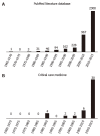Ethical publishing in intensive care medicine: A narrative review
- PMID: 27652208
- PMCID: PMC4986546
- DOI: 10.5492/wjccm.v5.i3.171
Ethical publishing in intensive care medicine: A narrative review
Abstract
Ethical standards in the context of scientific publications are increasingly gaining attention. A narrative review of the literature concerning publication ethics was conducted as found in PubMed, Google Scholar, relevant news articles, position papers, websites and other sources. The Committee on Publication Ethics has produced guidelines and schedules for the handling of problem situations that have been adopted by professional journals and publishers worldwide as guidelines to authors. The defined requirements go beyond the disclosure of conflicts of interest or the prior registration of clinical trials. Recommendations to authors, editors and publishers of journals and research institutions were formulated with regard to issues of authorship, double publications, plagiarism, and conflicts of interest, with special attention being paid to unethical research behavior and data falsification. This narrative review focusses on ethical publishing in intensive care medicine. As scientific misconduct with data falsification damage patients and society, especially if fraudulent studies are considered important or favor certain therapies and downplay their side effects, it is important to ensure that only studies are published that have been carried out with highest integrity according to predefined criteria. For that also the peer review process has to be conducted in accordance with the highest possible scientific standards and making use of available modern information technology. The review provides the current state of recommendations that are considered to be most relevant particularly in the field of intensive care medicine.
Keywords: Boldt fraud; Duplicate publication; Fujii fraud; Peer review; Plagiarism; Publication retractions; Scientific misconduct.
Figures

Similar articles
-
Ethical dilemmas in scientific publication: pitfalls and solutions for editors.Rev Saude Publica. 2006 Aug;40 Spec no.:24-9. doi: 10.1590/s0034-89102006000400004. Rev Saude Publica. 2006. PMID: 16924299
-
An analysis of retractions of papers authored by Scott Reuben, Joachim Boldt and Yoshitaka Fujii.Anaesthesia. 2019 Jan;74(1):17-21. doi: 10.1111/anae.14414. Epub 2018 Aug 24. Anaesthesia. 2019. PMID: 30144024
-
Pitfalls and Misconducts in Medical Writing.Int J Low Extrem Wounds. 2019 Dec;18(4):350-353. doi: 10.1177/1534734619870083. Epub 2019 Aug 29. Int J Low Extrem Wounds. 2019. PMID: 31464160
-
Integrity of clinical research conduct, reporting, publishing, and post-publication promotion in rheumatology.Clin Rheumatol. 2020 Apr;39(4):1049-1060. doi: 10.1007/s10067-020-04965-0. Epub 2020 Feb 5. Clin Rheumatol. 2020. PMID: 32026178 Review.
-
Statement on Publication Ethics for Editors and Publishers.J Korean Med Sci. 2016 Sep;31(9):1351-4. doi: 10.3346/jkms.2016.31.9.1351. J Korean Med Sci. 2016. PMID: 27510376 Free PMC article. Review.
Cited by
-
Renal Safety of Hydroxyethyl starch 130/0.42 After Cardiac Surgery: A Retrospective Cohort Analysis.Drug Saf. 2021 Dec;44(12):1311-1321. doi: 10.1007/s40264-021-01116-5. Epub 2021 Sep 26. Drug Saf. 2021. PMID: 34564829 Free PMC article.
-
Gating the holes in the Swiss cheese (part I): Expanding professor Reason's model for patient safety.J Eval Clin Pract. 2018 Feb;24(1):187-197. doi: 10.1111/jep.12847. Epub 2017 Nov 23. J Eval Clin Pract. 2018. PMID: 29168290 Free PMC article.
-
Moderator Effect of Hypoalbuminemia in Volume Resuscitation and Plasma Expansion with Intravenous Albumin Solution.Int J Mol Sci. 2022 Nov 16;23(22):14175. doi: 10.3390/ijms232214175. Int J Mol Sci. 2022. PMID: 36430652 Free PMC article. Review.
-
How Can the Implementation of Ethical Norms Be Guaranteed in Biomedical Studies?J Reprod Infertil. 2020 Apr-Jun;21(2):69-70. J Reprod Infertil. 2020. PMID: 32500009 Free PMC article. No abstract available.
-
The Boldt scandal still in need of action: the example of colloids 10 years after initial suspicion of fraud.Intensive Care Med. 2018 Oct;44(10):1735-1737. doi: 10.1007/s00134-018-5289-3. Epub 2018 Jul 2. Intensive Care Med. 2018. PMID: 29968012 Free PMC article. No abstract available.
References
-
- Caelleigh AS. Role of the journal editor in sustaining integrity in research. Acad Med. 1993;68:S23–S29. - PubMed
-
- Kranke P, Apfel CC, Roewer N, Fujii Y. Reported data on granisetron and postoperative nausea and vomiting by Fujii et al. Are incredibly nice! Anesth Analg. 2000;90:1004–1007. - PubMed
-
- Miller DR. Retraction of articles written by Dr. Yoshitaka Fujii. Can J Anaesth. 2012;59:1081–1088. - PubMed
-
- Carlisle JB. The analysis of 168 randomised controlled trials to test data integrity. Anaesthesia. 2012;67:521–537. - PubMed
-
- Editors-in-Chief statement regarding published clinical trials conducted without IRB approval by Joachim Boldt. Minerva Anestesiol. 2011;77:562–563. - PubMed
Publication types
LinkOut - more resources
Full Text Sources
Other Literature Sources
Research Materials

